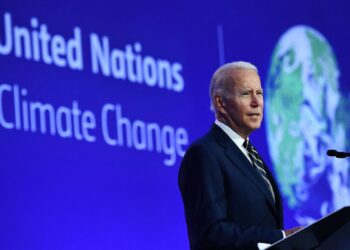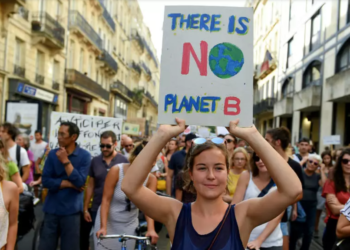What do you think of when you hear the words “climate change?” How about “global warming?” If you are a liberal or a member of the Democratic Party, you probably imagine melting ice caps, dying animal species, increased frequency of extreme weather events, and a host of other negative images. However, if you are a conservative or a member of the Republican Party, you probably just give an irritated smirk as you imagine an annoying “social justice warrior” motivated by a left-wing political agenda upon hearing the same words.
This reality tends itself to liberals and conservatives simply talking past each other rather than effectively communicating about this issue. If you, like myself, believe that climate change is one of the most pressing challenges that humanity currently faces, then hopefully you recognize that finding a way to weather this storm (no pun intended) will require the collective brain and willpower of more than just one political tribe.
It will require building a fruitful dialogue through which we can forge some common consensus that moves the needle forward, rather than results in pointless squabbles. For this reason, for all of us concerned about climate change or global warming, I suggest that we stop using the terms “climate change” and “global warming” when engaging with individuals who do not share our concern. Rather, let’s try something a little bit different.
What do you think of when you hear the word “pollution?” If you are a liberal, you probably think of smog, toxic air, dirty rivers, and mounds of smelly garbage. And if you are a conservative, you also probably think of smog, toxic air, dirty rivers, and mounds of smelly garbage.
That’s right, liberals and conservatives agree about what pollution is, and just about everyone associates it with something bad.
While the word pollution includes a lot of things not directly related to climate change, it also encompasses the release of greenhouse gases into the air that stimulates warming. Therefore, in addition to a host of other benefits, curbing pollution would inevitably stymie global warming as well. Using the word pollution when engaging with individuals skeptical of climate change might offer an opportunity to find common ground through which real progress can be achieved regarding public policy.
Almost all language carries with it a connotation and political baggage that has a profound impact on its receptibility. Therefore, it is incumbent upon anyone advocating a political cause to choose their words and craft their messages with an awareness as to how they will be received to maximize their effectiveness.
Take for example the issue of same-sex marriage. For generations, proponents of “gay marriage” made little progress in their quest to alter what was then a major taboo in our society. However, their agenda began to gain much more traction when the conversation changed from “gay marriage” to “marriage equality.” While gay marriage may not have been an idea that the average American felt comfortable with, marriage equality was.
Similarly, while not everyone agrees that the amount of carbon dioxide being released into the air is causing the earth to warm to a level with drastic consequences, almost everyone does agree that they don’t want to live in a dangerously dirty environment.
So, the next time that you see a debate on climate change heading your direction try floating the idea of decreasing pollution in the community rather than mentioning a two-inch rise in the sea level caused by global warming. While this surely won’t solve all our problems, it may help us all start having useful and productive conversations that will eventually improve the health of our planet.
Disclaimer: The views and opinions expressed here are those of the author and do not necessarily reflect the editorial position of The Globe Post.





















